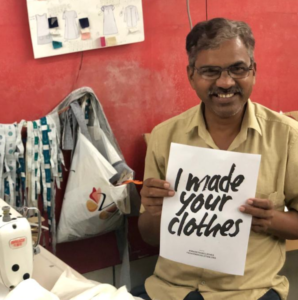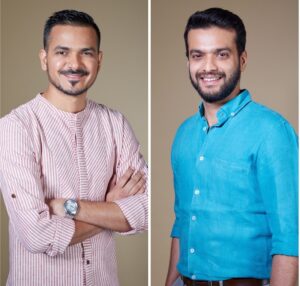Bombay Hemp Company
Hemp is where the heart is
Who is making the clothes?
All our clothes are manufactured at the Bombay Hemp Company headquarters in Lower Parel, Mumbai. Our production is handled by our colleagues, who we believe are the backbone of our business. Our masters, tailors and runners, who are also based out of Mumbai, have become family over the years.
Life-cycle of products and how environmental concerns are addressed in these
Our sustainable fashion and living brand, B Label, is constantly innovating and making products to create large-scale economic, environmental and social impact with the help of a sustainable resource, hemp. In India, hemp grows untamed and in abundance. The conventional practice has been to dispose of the hemp plants, perceived as so much trash. Our aim is to put this trash to use, to maximise hemp’s potential to bring together community, impact and value. In collaboration with educational institutions, we are researching the best ways for Indian hemp fibres to be converted into fabric that can be worn.
We source our handloom fabric from our partners in Uttarakhand who employ locals to collect and weave nettle and hemp to make beautiful fabrics that can be used for cushion covers, laptop sleeves, bags and other accessories.
We have an in-house designer who creates versatile, classic and timeless styles that can be worn for most things. We focus on creating these styles because it means that our products will be a part of our customers’ wardrobes far longer than any product purchased from a fast-fashion brand.
Our patterns are made keeping in mind the imperative to reduce fabric scraps and waste. Our sister brand, Hemp Fabric Lab, does a great job of providing these fabric scraps to designers, artists and innovators who have the chance to upcycle these scraps into beautiful productions.
Here is how we aim to address some environmental concerns:
- Ecologically, hemp grows magically. It grows at an extremely rapid rate and requires 400 times less water than cotton does; it requires little or no pesticides and is carbon-negative. As a fabric, hemp ages gracefully, and the fabric becomes softer with every wash. This in turn reduces the waste generated in the fashion industry by elongating the life span of each garment.
- We use buttons that are made from alternate materials, like coconut husk and mother-of-pearl, thereby reducing the use of plastic. It’s about choosing biodegradable solutions.
- We make sure to use toxic-free dyes like Azo-free direct dyes. The water used in the colouration follows recycling norms.
- Our packaging aims to use little or no plastic.
Challenges in scaling up sustainable fashion
There are three critical issues that stand out amongst the many that persist.
Infrastructure
As a company, we are striving towards disrupting not only the fashion industry but also the way the agrarian industry works. We need the support of adequate and advanced technology and infrastructure to convert the raw fibre we procure into a suitable finished product. Although hemp is an ancient crop, it stands as a novice amongst the rest when it comes to conversion of fibre into yarn; the infrastructure needed is backward, and in some cases non-existent in India, greatly limiting our capacity to scale in a circular manner. We are currently working with organisations to undertake research on creating and working with the infrastructure needed to achieve our envisioned end product. As a company, we are breaking myths about hemp and creating a certain amount of demand and market for the fabric, so that when the time comes, we have a larger audience who believe in hemp and its benefits.
Distribution of products
The time spent trying to master fabric selection, branding, merchandising and product packaging already comes at a cost. A critical challenge that further limits our scale is the distribution of products. Penetrating the market becomes a challenge with retailers being forced to sell the fabric at a minimum of four times the cost to make significant profits. This in turn puts the legitimacy of the brand in question, compromising on accessibility for the audience we would like to reach.
Raw material
The lack of more effective alternatives for unsustainable materials (plastic being the leader of the pack) is an industry-wide challenge. Plastic’s undeniable versatility backed by its cost-effectiveness makes it a material rather difficult to substitute.
That said, industrial hemp is a wonder crop and we mean to persist with our efforts to educate individuals around the world about it.

Chirag Tekchandaney and Yash Kotak, co-founders, Bombay Hemp Company
Things consumers should keep in mind
The biggest thing we can do is to urge consumers to ask questions:
Who is making my clothes?
What is the durability of the product I am about to buy?
What did it take to get it on the rack?
While shopping it may be hard to think of these things, but educating consumers about the disasters of the fashion industry can help push them away from fast-fashion brands.
A few tips:
- Invest in alternate fibres – Tencel, hemp, organic cotton. These may be a tad more expensive, but it is a small step in building a sustainable wardrobe.
- Support local brands. The domestic market is growing at a tremendous rate. If consumers want to spend money, we would urge them to support Indian brands that are trying to make a difference, as compared to the fast-fashion behemoths.
At B Label, we are constantly working to see how we can be a sustainable yet affordable brand. In the short term, we hope to work with what we have to launch more collections and categories that will provide solutions for more than just apparel.
In the long run, we want to achieve more control with regard to the production process, from seed to shirt, in order to ensure a completely transparent supply chain.
Womenswear: Tops, shirts, t-shirts, dresses, jackets, lounge pants and kurtas
Menswear: T-shirts, shirts, kurtas, bandis, jackets, lounge pants and shorts
Home accessories: Cushion covers, table mats, table runners and coasters
Travel line: Stoles and laptop sleeves
Where available: www.blabel.in
Click on the pages below to continue reading about the brands.
And here's a checklist for responsible brands.

